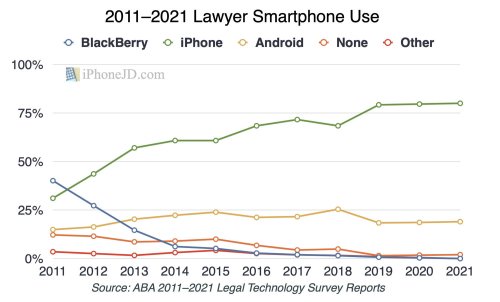My Two Cents: Anniversary of iPhone at 15: How has the introduction of the iPhone impacted where lawyers work?
/Last October, I commented on how technology has made leaps in the past 40 if not 50 years. These advances in technology have allowed growth in solo and small practitioners over the last few decades. We don’t have the overhead that was once required by antiquated law firms of the past.
SCREENSHOT FROM YOUTUBE VIDEO OF Steve Jobs showing iPhone’s competITORS At MacWorld 2007.
Lawyers don’t need secretaries to type our briefs. (I still say one of the best classes I took in high school was typing – it’s a skill I have used in almost every job I’ve had since high school – Thanks Mrs. Emery!!!) We don’t need clerks and paralegals spending days or weeks doing legal research in a law library – does anyone remember how to Shepardize by using a book? The reduction of staff and antiquated machinery reduces the size of the Brick-and-Mortar (B&M) office needed to run a law practice. But why then should lawyers be appreciative of the iPhone – regardless if you use an Apple, Windows, Android, etc. device?
SCREENSHOT FROM YOUTUBE VIDEO OF Steve Jobs Introducing The iPhone At MacWorld 2007.
When Steve Jobs introduced the iPhone 15 years ago, it was presented as having your music, phone, and the ability to surf the internet all in one device. The iPhone was certainly not the first device out there, and at the time, it did have competition, RIP Blackberry & RIP Motorolla Q (I had high hopes for this device when it first came out – I was disappointed – I did some Google research and it appears the device suffered a quiet death.). But it did make the idea of having a cell phone a sexy status symbol that everyone, including, lawyers, had to have. I think that as smartphones became “smarter” and more robust with features (photography, videos, storage, application stores, wifi, cellular data, etc.) attorneys were finding themselves not anchored to their B&M office chair) – not to mention that smartphones have been in recent years as ubiquitous as carrying your keys and wallet (both of which may not be needed in the near future as they are being replaced by our smartphones!).
Image created by our friend Jeff Richardson at iPhone JD.
The idea of mobile work didn’t start with a smartphone or a computer. Attorneys, law clerks, paralegals, and yes Judges for centuries would lug their papers and books home with them for after-hours work. This became a little easier with fax machines back in the 70s. A little more so with home computers (but there were few home computers as they were expensive) in the late 70s and early 80s. This helped spur the idea for lawyers to start telecommuting. But as computer prices started to come down (mid- to late- 80s) and the laptop was seen as more of a lifeline between work and home (mid 90s), the idea of working from home being your actual office started blossoming. I think the smartphone has helped us make that idea grow into a garden (starting in the early 2000s).
Image created by our friend Jeff Richardson at iPhone JD.
Today, you can do almost all of your work on a smartphone. You can access and even download your firm’s entire CRM and office files onto your phone. You can communicate with your clients, staff, opponents, court personnel, and potential clients with your smartphone’s voice, e-mail, and inter-office communications (Slack, MS Teams, etc.) programs. You could even draft documents and pleadings (in MS Word and Apple Pages), convert them into a pdf, and file them with some courts (admittedly with a lot of effort on the small screen [but we’ll talk about tablets another time]). You can now do almost all of your work anywhere you can take your phone. And what attorney leaves their home or workplace without their smartphone which in most cases is an iPhone.
The portability, ease of use with color touchscreens, and the oozed must-have sexiness sale by Steve Jobs created the sturdy bridge between an attorney’s law practice and the ability to do it all from home. And now from the after-effects of the pandemic, we know it's actually practical to work from home. Thanks Steve!













